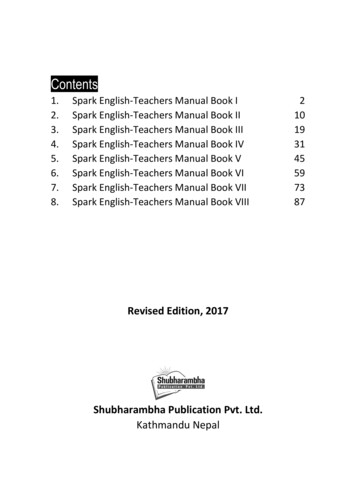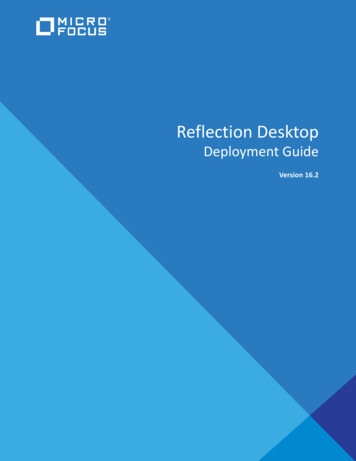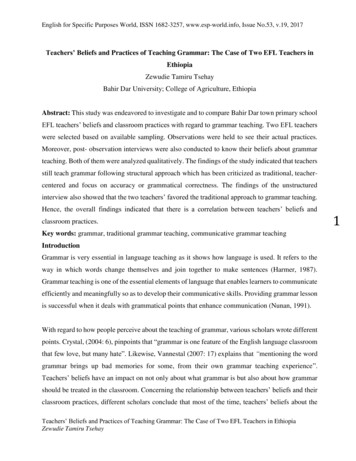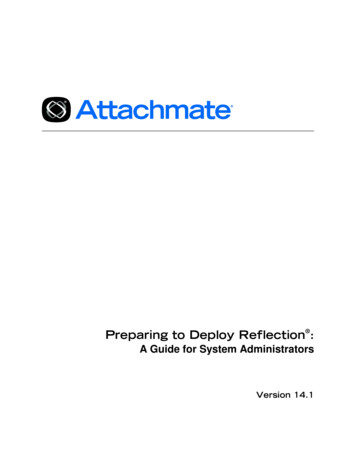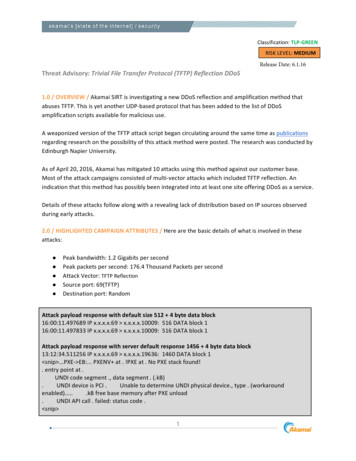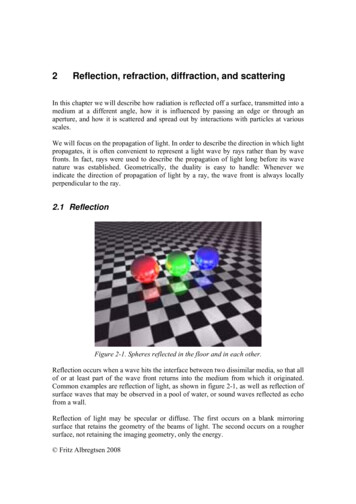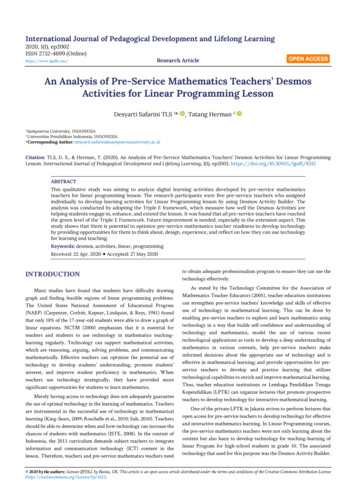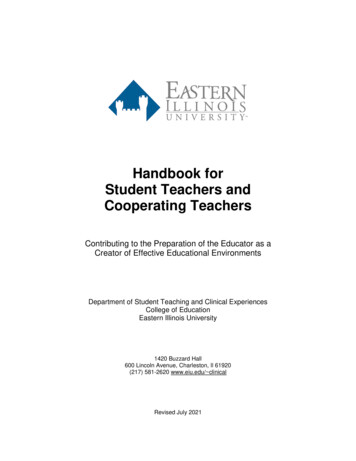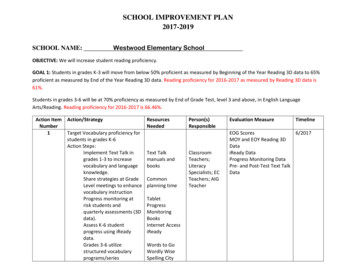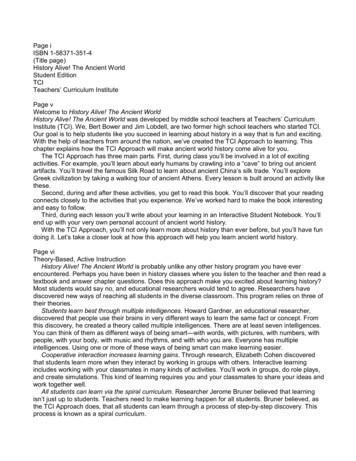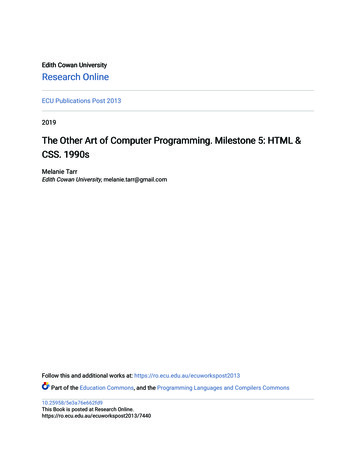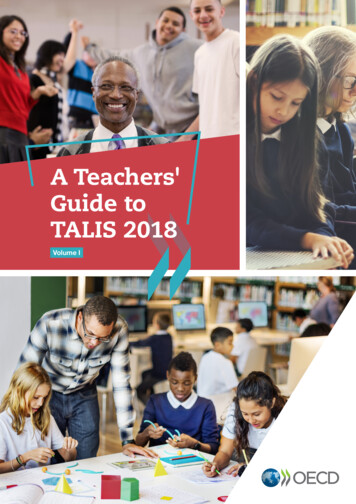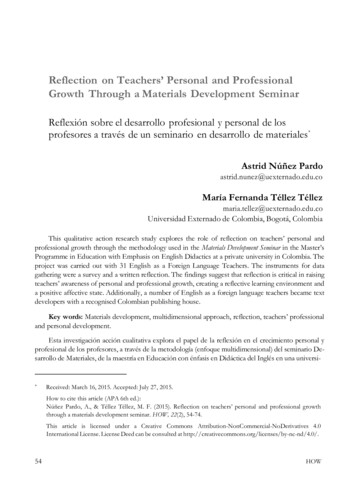
Transcription
Reflection on Teachers’ Personal and ProfessionalGrowth Through a Materials Development SeminarReflexión sobre el desarrollo profesional y personal de losprofesores a través de un seminario en desarrollo de materiales *Astrid Núñez Pardoastrid.nunez@uexternado.edu.coMaría Fernanda Téllez Téllezmaria.tellez@uexternado.edu.coUniversidad Externado de Colombia, Bogotá, ColombiaThis qualitative action research study explores the role of reflection on teachers’ personal andprofessional growth through the methodology used in the Materials Development Seminar in the Master’sProgramme in Education with Emphasis on English Didactics at a private university in Colombia. Theproject was carried out with 31 English as a Foreign Language Teachers. The instruments for datagathering were a survey and a written reflection. The findings suggest that reflection is critical in raisingteachers’ awareness of personal and professional growth, creating a reflective learning environment anda positive affective state. Additionally, a number of English as a foreign language teachers became textdevelopers with a recognised Colombian publishing house.Key words: Materials development, multidimensional approach, reflection, teachers’ professionaland personal development.Esta investigación acción cualitativa explora el papel de la reflexión en el crecimiento personal yprofesional de los profesores, a través de la metodología (enfoque multidimensional) del seminario Desarrollo de Materiales, de la maestría en Educación con énfasis en Didáctica del Inglés en una universi-*Received: March 16, 2015. Accepted: July 27, 2015.How to cite this article (APA 6th ed.):Núñez Pardo, A., & Téllez Téllez, M. F. (2015). Reflection on teachers’ personal and professional growththrough a materials development seminar. HOW, 22(2), 54-74.This article is licensed under a Creative Commons Attribution-NonCommercial-NoDerivatives 4.0International License. License Deed can be consulted at 54HOW
Astrid Núñez Pardo and María Fernanda Téllez Téllezdad privada en Bogotá, Colombia. El estudio se realizó con 31 profesores utilizando dos instrumentos:una encuesta y una reflexión escrita. Los hallazgos sugieren que la reflexión es un aspecto crítico en elcrecimiento personal y profesional de los profesores en la concienciación de su desarrollo personal yprofesional; en la creación de una atmósfera de reflexión y aprendizaje y un estado de afecto positivo.Adicionalmente, varios profesores son hoy autores de textos de enseñanza de inglés como lenguaextranjera en una casa editorial reconocida en Colombia.Palabras clave: desarrollo de materiales, desarrollo personal y profesional docente, enfoque multidimensional, reflexión.IntroductionThis qualitative action research study examined how teachers’ reflection on themethodology of the materials development (MD) seminar has shaped their personal andprofessional growth in the Master’s Programme in Education with Emphasis on EnglishDidactics (MEED) at a private university. Through our experience with this seminar andreflection on our pedagogical practice, we recognised theoretic and pragmatic problemsregarding teachers’ praxis in the English as a foreign language (EFL) classroom: disregard ofreflection on students’ needs, unawareness of learning and teaching approaches andmaterials, as well as the absence of customized criteria for the selection, development,adaptation, and evaluation of didactic materials.Theoretical FrameworkReflectionReflection guides teachers to self-dialogue and inquiry that lead the decision-makingprocess within teaching-learning contexts. In this respect, Schön contended that “reflectivityis a dialogue of thinking and doing through which I become more skilful” (as cited inGiovannelli, 2003, p. 293). The author further identified “reflection in action,” which entailsself-critique when understanding a phenomenon and how we re-describe it throughexperimentation and “reflection on action” that implies rebuilding and examining actions andevents. In light of this, teachers’ reflection should start with the EFL classroom assessment,focused on self-assessment of their pedagogical practices, language teaching and materialsand their effect on students’ learning outcomes, which might enable them to reconstruct andimprove a particular teaching and/or learning situation.Likewise, Rodgers (as cited in Núñez, Ramos, & Téllez, 2006) argued that reflecting onthe teaching context centres teachers on what truly happens in the classroom, not on whatthey expect to happen. This can be done in a four-stage sequence: “presence in experience”(recognising crucial aspects to alert teachers about why and how to handle a classroom event);HOW Vol. 22, No. 2, October 2015/March 2016, ISSN 0120-5927. Bogotá, Colombia. Pages: 54-7455
Reflection on Teachers’ Personal and Professional Growth Througha Materials Development Seminar“describing experience” (objectively addressing classroom observation); “analysis of classperformance” (teachers’ justification of the issues observed); and “taking intelligent action”(trying out and innovating in the EFL classroom) (p. 112, trans.). Hence, reflection mightshape MD and teachers’ personal and professional growth. The former benefits fromreflection as the core concern of teachers as materials developers to fulfil the learners’ needsand interests and the latter capitalises on teachers’ awareness of how their reflective practiceworks and its incidence in their personal and professional development.Wink (as cited in Núñez et al., 2006) emphasised that the reflection process allowseducators to devote time to learn, unlearn, and relearn on their teaching practice. Researcherslike Barlett (1990), Pollard and Tann (1993), Viafara (2005), and Wallace (1991) suggestedreflective cycles to lead teachers into knowing how they teach, self-assessing their teachingpractice and planning to make informed decisions that may refine their teaching. This isrelated to Rodger’s reflective sequence; that is, teachers reflect upon, assess, and act toimprove their teaching.Furthermore, Loughran (2002) claimed that “one element of reflection that is common tomany is the notion of a problem. What that problem is, the way it is framed and reframed, isan important aspect of understanding the nature of reflection” (p. 33). Similarly, Núñez et al.(2006) remarked that “reflection should be a constant process among teachers that permits tosolve teaching and learning problems” (p. 113, trans.). The notion of a problem fostersreflection since teachers’ concerns make them act to alleviate a learning difficulty.Therefore, what reflection represents in the selection, creation, or evaluation ofmaterials is a learning opportunity for teachers to ponder learners’ needs, languagelearning and teaching theories, principles of second language acquisition ( SLA ), syllabusdesign with meaningful and engaging content and activities, application of learningstrategies, opportunities for output activities and intended outcome, and creation ofeffective learning settings. As Núñez and Téllez (2009) affirmed: “The onset of teachers’reflection is the individual assessment of the EFL classroom, which enable[s] them tomake decisions when they create or adapt materials that fulfil particular needs andlearning setting” (p. 172).Likewise, what reflection does in teachers’ personal and professional development entailsthe self-recognition and assessment of their teaching aimed at improving their classroomperformance through the development of materials that are responsive to their local needs.As Núñez et al. (2006) contended:Reflecting is a vital activity for professional and personal development since it leads the teacher to aprocess of self-recognition of his performance and to a self-evaluation that simultaneously allowshim to make changes and implement innovations not only to the methodological approach, but56HOW
Astrid Núñez Pardo and María Fernanda Téllez Téllezalso to the selection and development of meaningfully contextualized materials. (pp. 114-115,trans.)Thus, reflecting is a systematic ongoing process among teachers and text developers,which can be done by contextualising materials to gain self-confidence, self-esteem andexpertise, and achieve teacher development as well (Tomlinson, 2003).The Multidimensional ApproachThe multidimensional approach (Tomlinson, 2000) framing the MD seminar consists ofgiving teachers opportunities, in which a number of learning and communication principlesinterplay, to have them reflect upon their teaching, the materials and their effect on students’learning results. It favours the affective appeal, meaningful connections between new and oldexperiences, sensory imaging, inner voice, and pertinent content. In the seminar, affectpermeates class activities, scaffolding, and MD modelling. Taniguchi’s (2005) words: “affect isproduced along with different teachers’ orientations towards teaching and the student’sreaction to it” (p. 80).The affect involved in the classroom is not the result of words of emotions; instead, asTaniguchi (2005) emphasised, “it refers to one’s state of emotion produced with the languageuse in interaction” (p. 81). We believe that cognitive and affective interaction enables teachersto make informed decisions regarding their teaching practice and the materials they developand implement.Materials DevelopmentLanguage pedagogy and applied linguistics have recently recognised that MD is a fieldof study focused on the effect of materials on the teaching-learning process of a foreignlanguage. Researchers such as Bolitho (2003); Maley (2003); McDonough and Shaw(2003); Neville (1991); Núñez, Téllez, and Castellanos (2013); Pulverness (2003); Sercu etal. (2005); Timmis (2002); and Tomlinson (2008) stated that MD entails several issues:inspiration, theoretical foundations, methods and principles supported by effectiveness,suitability, and applicability to current socio-cultural aspects. MD, “as a field of study,demands an informed methodology that allows validating the efficiency, appropriatenessand relevance of materials within the context of learning a language” (Núñez et al., 2013,p. 10).Reflection, awareness of and MD rationale, affect, motivation, teachers’ beliefs, creativity,and commitment are the components that interplay in MD. The outcome of this processcomprises materials like a book, a module, a didactic unit, a workshop, a worksheet, a lesson,or a learning task. This typology responds to local needs of teaching settings.HOW Vol. 22, No. 2, October 2015/March 2016, ISSN 0120-5927. Bogotá, Colombia. Pages: 54-7457
Reflection on Teachers’ Personal and Professional Growth Througha Materials Development SeminarNúñez et al. (2013) affirm that “materials . . . are socio-cultural resources that facilitate notonly linguistic interaction but also cultural exchanges between the various human groups.Moreover, they are forms of social mediation that allow flow of knowledge” (p. 10). We alsoagree with Xiaotang’s (2004) stance that “materials are not just tools; they represent the aims,values, and methods in teaching a foreign language. Materials are the most powerful device inspreading new methodological ideas and in shaping language teaching and learning practice”(p 1). Thus, developing materials gives teachers the possibility to reflect, innovate, createbetter teaching and learning settings, and grow as individuals and professionals (Núñez &Téllez, 2009; Núñez, Téllez, Castellanos, & Ramos, 2009).At the MEED, teachers should develop contextualised materials that respond to theirstudents’ needs. Materials that address learners’ genuine interests, knowledge, experience andunderstanding of language use create effective learning environments (Cárdenas, 2008;Núñez et al., 2009; Núñez, Pineda, & Téllez, 2004; Tomlinson, 2003). In this respect, Kesslerand Plakans (2001) mention that “[teachers] are the most immediate experts on the needs ofESOL learners, the cognitive abilities of different age groups and the learning process of theirspecific learners” (p. 15).Teacher Professional and Personal DevelopmentSeveral scholars considered teacher development as an evolving learning process(Cárdenas, González, & Álvarez, 2010; Diaz-Maggioli (as cited in González, 2007);Freeman, 1989; James, 2001; Richards & Farrell, 2005). Likewise, Richards and Farrell(2005) deemed teacher professional development as long-term personal growth that aidsteachers’ defining and making sense of their teaching practice and of themselves asindividuals. Moreover, self-development and self-direction are vital for teacherdevelopment (Nunan & Lamb, 1996). As Hiemstra and Brockett (1991) confirmed, theyare “characteristics of an individual that predispose one toward taking primaryresponsibility for personal learning and endeavours” (p. 29). Furthermore, Diaz-Maggioli(as cited in González, 2005) asserted that teacher development is “an ongoing learningprocess in which teachers engage voluntarily to learn how best to adjust their teaching tothe learning needs of their students” (p. 310). Finally, Tomlinson (2003) describedteacher development as “a multi-dimensional awareness . . . and the ability to apply thisawareness to their actual contexts of teaching” (para. 7).At the national level, the Ministry of Education (MEN) and the Secretaries of Education(SED) in Colombia established three interrelated pillars for teacher development: Updating,innovating, and researching (Cárdenas et al., 2010), which teacher education programmesought to address for teacher personal and professional development. Consequently, teacherdevelopment entails a long-lasting personal and professional process favouring constant58HOW
Astrid Núñez Pardo and María Fernanda Téllez Téllezself-reflection to enhance EFL teaching and learning potentialities that benefit students’learning endeavours through contextualised materials. In our study, teachers who are enrolledin the MEED are informed along a two-year period to do research and become agents ofchange by developing and implementing contextualised materials within their contexts forthe pedagogical interventions of their research studies.Research DesignWe adopted a qualitative, interpretative, and descriptive approach, which on the one hand,according to Sandin (2003), is “a systematic activity guided to the comprehension ofeducational phenomenon and the transformation of the socio-educational sceneries” (p.123). On the other hand, for Burns (2010) it is suitable to identify problematic situations in aparticular context to improve the unsolved concern. This approach also recognises theoutcomes given in a natural setting by using methods that imply close interaction with theparticipants (Snape & Spencer, 2003). In our study, qualitative findings were complementedby quantitative data gathered through a survey administered to teachers.Type of StudyThis action research study is an organized reflective process with the purpose oftransforming and alleviating a detected concern in a given context (Mills as cited in Mertler,2009; Stringer as cited in Mertler, 2009; Wallace as cited in Donato, 2003) that also generateschanges that improve teaching performance and reflective practices (Burns, 2010). Regardingour research question on how teachers’ reflection on the methodology of the MD seminarshapes their personal and professional growth, we followed Kemmis and McTaggart’s (1988)cycles of action research, namely, planning the seminar, acting or implementing the reflectiveactivities, observing, and reflecting to make further adjustments.Context and ParticipantsWe conducted this study in the MEED at a private university in Bogotá (Colombia), whichhas a libertarian philosophy and fosters democracy, autonomy, and honesty. Our sample wascomposed of 31 teachers—20 women and 11 men enrolled at the MEED—who signed aconsent letter. Thirteen teachers were aged from 20 to 30 years, 14 from 30 to 40, three from40 to 50, and one was older than 50. Out of the 31 teachers, 20 work for public schools and 11for private institutions; 65% hold a BA, 16% have a specialisation degree, and 19% have beenawarded an MA in Education. We sent the survey to all participants from the four groups (60teachers) who attended the MD seminar. From these 60 teachers, 31 responded to the surveyand their answers were analysed. They were chosen based on their willingness, availability,HOW Vol. 22, No. 2, October 2015/March 2016, ISSN 0120-5927. Bogotá, Colombia. Pages: 54-7459
Reflection on Teachers’ Personal and Professional Growth Througha Materials Development Seminarand disposition to participate in the study and answer the survey (convenience samplingtechnique: Steven, 1996; Teddlie & Yu, 2007).Data Gathering InstrumentsSurvey. A survey is “a systematic method for gathering information from (a sample of)entities for the purpose of constructing quantitative descriptors of the attributes of the largerpopulation of which the entities are members” (Groves et al., 2004, p. 4). As surveys areuseful to analyse opinions and perceptions of participants regarding research interests, weadministered a structured one (see Appendix) that included demographic, background, andexperience questions (Patton as cited in Brown, 2001). The teachers answered it aftercompleting the MD seminar for us to see how their reflection on the methodology of theseminar shapes their personal and professional growth.Teachers’ written reflections. Teachers pondered the content, activities, materials,methodology, and the learning atmosphere of the MD seminar in a written reflection. AsMaughan and Webb (2001) sustained, reflecting includes (a) recapturing the experience of anevent (our MD seminar); (b) examining the event from several angles (content, activities,materials, methodology, and the learning atmosphere of the MD seminar), and (c) recognisingthe worth of the event (for teachers’ personal and professional growth).Instructional DesignOur intervention consisted of several reflective activities on the methodology of the MDseminar to see its impact on teachers’ personal and professional growth. They includedteachers’ perceptions of MD in connection to their teaching; selection of the SLA principlesrelevant to the development of contextualised materials; statement of the pedagogical criteriafor materials selection and evaluation in local contexts; application of the learning principlesunder the multidimensional approach to plan a lesson; and a final written reflection on thecontent, materials, activities, methodology, and the learning atmosphere of the MD seminar.These took place during four semesters and were adjusted continuously in an attempt toanswer our research concern. Its main objective was to awaken teachers’ attitudes and skills toapproach MD from a more social, political, and professional perspective when addressingspecific problems regarding the contextualisation of materials for the pedagogicalintervention of their research studies.Data AnalysisWe used the grounded approach to analyse the data in which “the codes emerge from thedata via a process of reading and thinking about the text material” (Lichtman, 2006, p. 164).60HOW
Astrid Núñez Pardo and María Fernanda Téllez TéllezTo identify commonalities and differences and establish relationships among them, weemployed the colour-coding technique. Glaser (as cited in Walker & Myrick, 2006) describedthe code as “the essential relationship between data and theory” and coding as a process that“gets the analyst off the empirical level by fracturing the data, then conceptually grouping itinto codes that then become the theory which explains what is happening in the data” (p. 55).The triangulation process involved the methodological (several sources) and theoreticalperspectives (different perspectives) as defined by Denzin and Lincoln (1994).ResultsRaising Teachers’ Awareness of Their Personaland Professional GrowthThis category entails two features: Enhancing teachers’ MD knowledge, pedagogical practices, andresearch projects and Fostering self-confidence, creativity, and self-esteem. For Richards and Farrel (2005),developing professionally implies long-term personal growth that helps teachers define andre-define their pedagogical practice and themselves as individuals. In the Colombian context,the MEN and SED determined that teacher education programmes should address updating,innovating, and researching to reach teachers’ personal and professional development(Cárdenas et al., 2010). Tomlinson (2003) highlights that “helping teachers to developeffective materials for themselves can help them to become more positive and confident andto become more effective teachers too” (para. 1).Enhancing teachers’ MD knowledge, pedagogical practices, and research projects.This subcategory refers to teachers’ acknowledgment of the role of reflection in increasing theirknowledge about the MD field, changing their pedagogical practices, and refining their researchprojects. Researchers like McGrath (2001); Samuda (as cited in Harwood, 2010); and Tomlinson(2003) declared that MD should be incorporated into teachers’ education programmes. By givingparticipating teachers the opportunity to be informed about MD and develop contextualisedmaterials for their pedagogical interventions, they expanded their knowledge of MD and grew asindividuals and professionals; as stated by Tomlinson (2003): “Providing teachers . . . with theopportunity to develop expertise for themselves as materials developers can quite definitely helpthem to develop and grow” (para. 9). They also defined and made sense of their pedagogicalpractices (Richards & Farrel, 2005) and adapted them to students’ needs (Diaz-Maggioli as cited inGonzález, 2007); assumed the responsibility and autonomy for their personal learning (Hiemstra& Brockett, 1991); and refined their research studies, as illustrated in the excerpts below.Materials development has been an excellent experience for me to grow in my professional fieldbecause the class gives the theoretical foundations of MD, tools to improve, feel confident andHOW Vol. 22, No. 2, October 2015/March 2016, ISSN 0120-5927. Bogotá, Colombia. Pages: 54-7461
Reflection on Teachers’ Personal and Professional Growth Througha Materials Development Seminarinnovate in my teaching practice by creating materials that take into account students’ interests, andcomplements the pedagogical intervention of my research project. [sic] (Reflection)The seminar “Materials Development” was a learning space in which motivation and constantreflection influence the teaching practice and in the research process. It is the starting point todevelop materials because the seminar gave us self-confidence and motivation at the moment ofbeing creative during the pedagogical intervention of my research project. [sic] (Survey)The following percentages refer to teachers’ perceptions regarding aspects of theirprofessional and personal growth that were influenced by the MD seminar: It gave sense totheir teaching practice (32%), helped re-signify their role as EFL teachers (55%), aided themto assume responsibility and autonomy for their personal learning (32%), and made themadapt their teaching practice to their students’ needs (55%).Fifty-eight percent of the teachers affirmed that the seminar caused them to reflect on theimpact of materials development in their personal and professional growth and 87% of theteachers indicated that the MD seminar influenced their knowledge, the innovation in theirlocal context (teaching practice) and the development of their research projects.Moreover, teachers remarked on the importance of administering a survey to analysetheir students’ needs in their contexts prior to developing contextualised materials.Regarding students’ needs, Diaz-Maggioli (as cited in González, 2007) and Tomlinson(2003), ascertained that teacher development entails refining their insights and skills inlearning how to respond to students’ needs in particular teaching settings. In this regard,Núñez and Téllez (2008) remarked that “any decision made in the classroom should beinformed by a serious needs analysis because it may help teachers be aware of what isactually happening in the classroom” (p. 68). Addressing students’ needs incontextualised materials raised teachers’ awareness of their personal and professionalgrowth, as can be seen in the following excerpt:In this seminar I learned to take into account the students’ needs and interests at the moment ofdesigning or creating new materials to implement in my pedagogical intervention. Also, I haverealized that we teachers as creators of materials can make our classes more attractive and effective.(Reflection)Getting to know who my students are and their context gives me a closer look at their realselves, their likes, their preferences, their learning styles, their needs; and when I becomeacquainted with this information, I get to approach my job in a more humane and meaningfulway. [sic] (Survey)Fostering self-confidence, creativity, and self-esteem. The factor that showedteachers’ awareness of their personal and professional growth during the MD seminarincluded empowering themselves in MD. In this sense, Tomlinson (2003) asserted that“teacher development . . . can lead to the development of teachers with confidence, creativity,62HOW
Astrid Núñez Pardo and María Fernanda Téllez Téllezflexibility and self-esteem (para. 9). Indeed, teachers not only discovered their potentialities tocreate, adapt, or evaluate materials, but also the resulting effect in terms of self-assurance andself-esteem gained in the MD learning experience. These variables are revealed as aspectsinvolved in MD.Now, after attending the seminar, I am convinced of my capabilities to develop innovative andattractive materials for my students. I know that designing materials is a valued field that can giveme professional opportunities. [sic] (Reflection)Developing materials requires, besides theory, great creativity on the part of the teacher. It createsappropriate learning settings, enhances students’ participation, and promotes teachers’ assuranceas facilitator and text developer. [sic] (Reflection)Up to a personal level, I became self-confident with the certainty of doing things well, bearing inmind the students as the main actors of learning. (Survey)The seminar methodology fosters reflection upon the improvement of materials and motivatescreativity. (Survey)Teachers’ reflections emphasised their role of being innovative and self-confident toinfluence their educational context, and also a strong sense of worth regarding MD. We agreewith Tomlinson’s (2003) view, to wit:A materials development as teacher development course can not only help teachers to develop usefulexpertise as materials developers. It can also help teachers to articulate and develop their own theoriesof language learning and teaching, to develop skills which can enable them to apply these theories topractice and to develop personal attributes which can help them to become more confident andpositive people and more effective teachers too. (p. 32)The excerpts below show teachers’ role as innovative and self-confident agents whoinfluence their educational context regarding the aforementioned aspects.I have learned that materials development is an innovative activity that allows teachers to exploredifferent alternatives to develop creativity. It also offers opportunities for professional growth andopens doors in the labor market. [sic] (Reflection)Forty-two percent of the teachers said that the seminar allowed them to increase theirself-confidence, creativity, and self-esteem as teachers and as persons.I also learned to do it [develop materials] with passion to improve not only communicative skills,but also self-esteem. [sic] (Survey)Creating a Reflective Learning EnvironmentThis category and its two subcategories—Engaging teachers in relevant activities and Motivatingreflection on teachers’ pedagogical and research practice—are associated with aspects such aschallenging teachers in reflective activities and generating a sense of engagement. RegardingHOW Vol. 22, No. 2, October 2015/March 2016, ISSN 0120-5927. Bogotá, Colombia. Pages: 54-7463
Reflection on Teachers’ Personal and Professional Growth Througha Materials Development Seminarthese aspects, Tomlinson (2003) mentioned that MD “encourage[s] reflection andself-evaluation so that the teachers can learn from themselves and can develop the habit ofpositive but critical reflection on their attempts to help their learners” (“The Principles ofMaterials Development,” para. 7). Teachers learnt that reflection should be part of dailypractice in the materials they develop to motivate students towards learning the Englishlanguage, as illustrated in the two subcategories.Engaging teachers in relevant activities. This subcategory implies inviting teachers toparticipate in activities to interpret, deduce, and contextualise components of the MD processsuch as reflection, awareness of an MD rationale, affect, motivation, teachers’ beliefs,creativity and commitment. The activities proposed in the seminar aim at sharpeningteachers’ insights on an MD rationale, a vital issue for making informed decisions whendeveloping materials. The knowledge of the MD rationale involves an informed theoreticalframework for MD, SLA principles, MD tenets derived for the former, a theory of the natureof language and language learning, and a methodological teaching and learning approachunderlying teacher-generated materials.In view of the teachers’ voices, the professor’s knowledge of the MD domain, her personalway of placing affect at the centre of her approach plus her devotion and personality traits allplayed a fundamental role to create an engaging learning atmosphere. In this regard,Tomlinson (2000) remarked on the
performance through the development of materials that are responsive to their local needs. As Núñez et al. (2006) contended: Reflecting is a vital activity for professional and personal development since it leads the teacher to a process of self-recognition of his perfor
